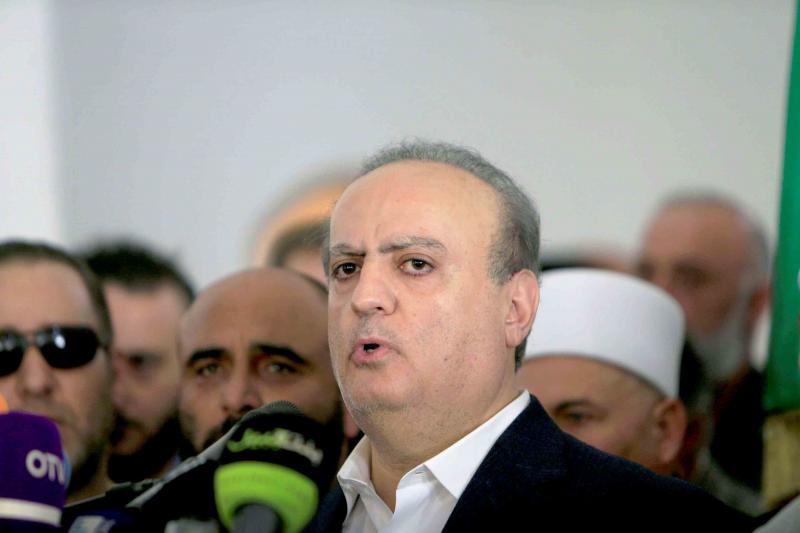Wahhab’s tactics are a recipe for disaster
مكرم رباح: تكتيكات وئام وهاب هي وصفة لكارثة
Makram Rabah/The Arab Weekly/December 10/18
Hezbollah’s only way out of this quagmire is to abandon its support of Wahhab, whose words and actions make a recipe for disaster.
Lebanon, contrary to how it is depicted by the international media, is one of the safest countries in the world with very low crime rates compared to some cities in the United States such as Chicago or Washington.
Yet, this semblance of peace can quickly give way to the outbreak of political violence, which can be equally deadly and can lead to the paralysis of the entire country. The incident that involved pro-Syrian Lebanese politician Wiam Wahhab and the Internal Security Forces that led to the death of one of his bodyguards is a case in point.
Wahhab, a former minister of the environment during the Syrian hegemony over Lebanon (1990-2005), acquired his fame for disregarding political correctness and moral decency, something that unfortunately made him a favourite to many who find his rhetoric as amusing. Yet Wahhab’s Trump-like demeanour is a smokescreen for a more vicious and calculated scheme to peddle the Assad-Iranian agenda.
Part of an elaborate network of pro-Syrian Lebanese mouthpieces, Wahhab has constantly attacked Syria’s opponents, primarily Lebanese Prime Minister Saad Hariri and Druze chieftain Walid Jumblatt, accusing them of corruption and — more dangerously — of being lackeys of the West.
Wahhab’s attack on Hariri peaked after the latter’s adamant refusal to acquiesce to Hezbollah’s pressures to form the next government and to include a pro-Syrian Sunni minister.
Hariri’s refusal earned him a full barrage of insults from Wahhab, who even insulted Hariri’s late father, former Prime Minister Rafik Hariri who was assassinated in 2005. These profane remarks provoked sectarian strife and Sunni supporters of Hariri took to the streets to protest across many parts of the country.
Jumblatt’s open support of Hariri led Wahhab to provoke the leader of the Druze by dispatching a car convoy of his supporters to parade through Jumblatt’s hometown of Moukhtara in the Chouf Mountains, a move that was perceived as a provocation and crossing of Druze tribal red lines.
Initially, Hariri’s civilised reaction was to take legal action against Wahhab, who was subpoenaed by the Lebanese judiciary but failed to present himself or his lawyer for questioning.
Wahhab’s contempt led Lebanese authorities to dispatch a sizeable police force to Wahhab’s village as a public rebuke and to inform him of the consequences of his failure to abide by the subpoena.
The police force, comprised of the elite intelligence branch division and travelling in armoured personal carriers, was met with armed resistance by Wahhab’s henchmen who tried to prevent authorities from carrying out their duties. The raid resulted in the death of Wahhab’s bodyguard Mohammed Bou Diab, who was killed by a stray bullet, which may have been fired by his associates.
Wahhab instantly used the tragic incident to victimise himself and accuse Hariri and the Lebanese judiciary of trying to silence him as a “crusader” against their vehement corruption. Helped by local media, which were anxious for ratings, Wahhab turned Bou Diab’s funeral into a venue for pro-Syrian and Iranian politicians and lackeys to show support and to paint him as a legitimate voice of opposition to Hariri and Jumblatt.
Looking through Wahhab’s elaborate and dangerous actions one can see the fingerprints of the Assad regime, which wishes to make a comeback on the Lebanese political scene at any cost, even spilling the blood of the innocent.
These same outdated tactics that Wahhab uses against Saad Hariri were used against Rafik Hariri to remind him that his political — and physical — wellbeing was contingent on him abiding by their directives.
The main problem is not only with the likes of Wahhab but rather with Hezbollah, which nurtures and operates such specimens to badger and harass anyone who dares call them out as true enemies of the Lebanese state. Despite Hezbollah’s open refusal of Wahhab’s earlier statements, it provides him with political and financial support to operate his clientelist network and his militia.
Hezbollah’s actions and its use of puppets might lead one to believe that it is a sign of strength but they confirm Hezbollah’s predicament and distress over impending US sanctions that will cripple its ability to operate. It is no mere coincidence that Wahhab’s ruckus conveniently preceded Israel’s operation in southern Lebanon that involved the demolition of Hezbollah tunnels on the Israeli border.
Hezbollah and its Iranian command might be convinced that Wahhab’s loud mouth and their insistence to transform Lebanon into the next Gaza — by digging tunnels and setting up missile factories — will protect them.
Yet, what is certain is that if Hezbollah truly wants to protect itself, it should realise that it is unwise and counterproductive to take Lebanon hostage and its only way out of this quagmire is to abandon its support of Wahhab, whose words and actions make a recipe for disaster.
**Makram Rabah is a lecturer at the American University of Beirut, Department of History. He is the author of A Campus at War: Student Politics at the American University of Beirut, 1967-1975.






















